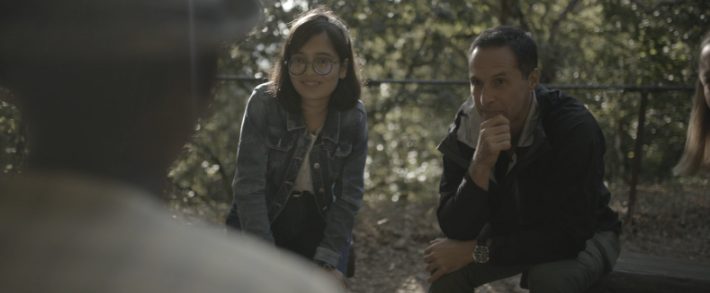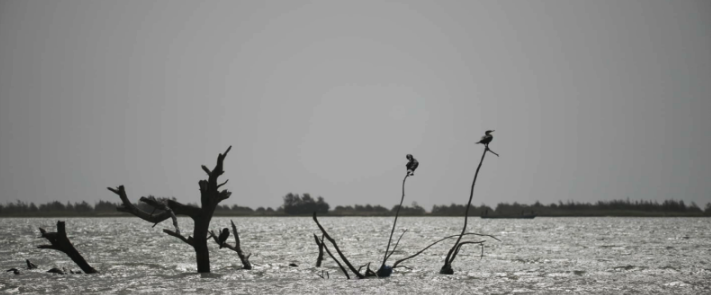
Hello everyone! Thank you once again for having me as one of your guests. I would like to thank the members of this organization for their invitation and for organizing this Earth Day event.
I warmly greet the many people who are here to attend this event.
In fact, I also greet Ridhima who is in this room. On behalf of my colleagues who were in the film with me, I would like you to give her a round of applause.
This film aims to show the consequences of global warming and the degradation of our environment, but also how to prevent it. I will not hide it from you. When we talk about global warming, we can’t limit ourselves to a single geographical area. Which means that it has become a global problem. That is why this film has brought together people from different countries including Brazil, India, the United States, and finally Senegal, the country where I am from.

Arouna in conversation with Ridhima Pandey and Greg Asner during the filming of The Letter.
Why Senegal and Arouna in particular? The young boy that you saw in the film is from Senegal. Arouna was born in a village called Vinsako Yéro located in the Sédhiou region. This region is one of the three regions of Casamance, in the south of Senegal. The three regions are Ziguinchor, Sédhiou and Kolda. The southern part of Senegal is called Casamance, meaning the natural region of Casamance. Due to its geographical location and thanks to the generosity of nature, it has the densest vegetation of the country. There are sacred forests, which are the main foundations of the tradition defining the relationship between local people and trees alongside classified forests under management since 1932, gallery forests, mangrove forests and other plant formations. Together, they give the Casamance region its green color.
However, for a few years now, locals have been crying foul. The Casamance Forest is no longer what it was 50 years ago. Everywhere around the region, the damage caused by human action is visible. The way humans use the environment leads to social and environmental changes with a significant impact on natural resources. Environmental crime has thrived because of this situation, allowing activities linked to illegal logging to emerge, with many different groups of people involved.
“Illegal logging” is the term used to describe the cutting down of trees to harvest wood with no regard for the law. These illegal activities in the Casamance Forest benefit from general insecurity in some areas of the forest. And we often forget to mention farmers who cut down trees to grow crops instead in order to provide for themselves and their families. They grow food to feed their families and to earn a living so that they can buy school supplies for their children. And to be able to access healthcare if they become ill. This unfair situation has contributed to the negative consequences of global warming. Global warming has cost us dearly because it has forced us to leave our own villages to seek shelter. But it has also led to the deaths of many young people who decided to make the journey to Europe illegally. The fact that people are leaving is visible in large cities such as Dakar and Saint-Louis.

A Senegalese child poses for a photograph during filming of The Letter
That is why I was forced to leave my village and move to a daara in Saint-Louis. Although there are other factors, such as a lack of effort to plant trees and government inaction when it comes to developing schools and other infrastructure, global warming is the real driver.
Global warming has caused a lot of harm in my life. As a result, I became a talibé. A talibé is usually a boy aged between 5 and 15 years old, from a poor family, often rural. His parents send him to a Koranic master (or marabout) so that his religious education will be taken care of. This education takes place in a Daara, also called a Koranic school. In return, the talibé must do domestic work and is generally forced to beg on the streets to support himself and his master.
In recent years, heavy rain and storms have caused the worst floods ever seen in the Daaras. We lost our home and many talibé children were displaced.
This is a devastating situation for the talibé children. Because of the floods, we are exposed and many of us do not have access to clean water, food or even shoes to protect our feet. Flood water becomes toxic and contributes to the spread of disease and infection, putting our lives at risk. Many daaras have not been able to drain the water, although we tried to do so with buckets. The water table was so full that the water would come back as soon as the children removed it. Many of us had no choice but to sleep on the side of the road or in front of the mosques, waiting for a solution to be found.

A drowned village in Senegal.
I spent 12 years on the streets, trying to fulfill my own needs as a child until I grew up and became part of a society where I had to fight to find my place. I had lost hope, but meeting Pope Francis gave me motivation within this complex world taking shape inside us. I feel more determined to understand and analyze all the important trends that influence our societies. I am ready to play an active role by providing information to citizens, so that they are better equipped to understand and take action in a changing world.
Finally, we are calling for people from around the world to take a moment and look at themselves in the mirror, so that we can stand together and say “no.”
Again, we are calling for people from around the world to take a moment and look at themselves in the mirror, so that we can stand together and say “no.” We have to work together because Europe cannot do without Africa and Africa cannot do without Europe, America, Oceania and so on.
As we celebrate Earth Day, nobody should ignore the cry of the Earth and the cry of the poor. Do we all have a responsibility?
But where does the responsibility of each of us lie?
Happy Earth Day
Thank you for your attention.





